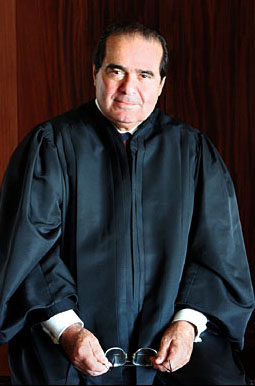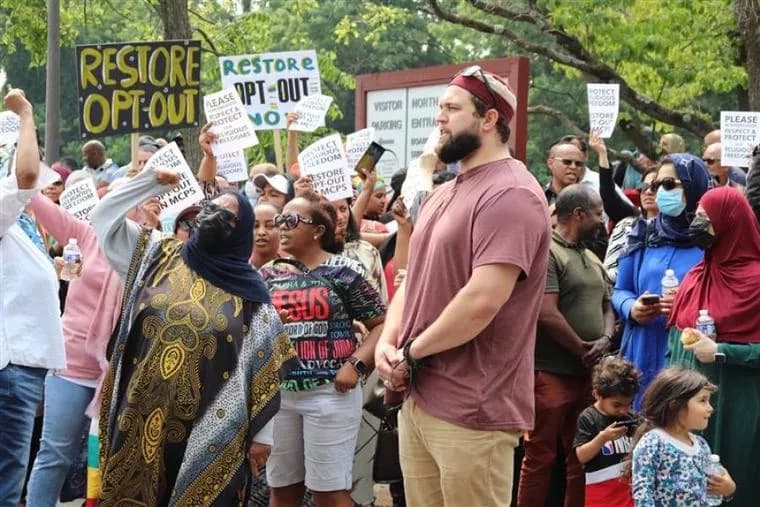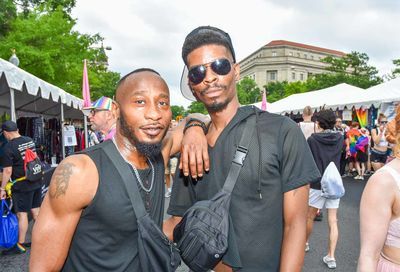Signing Statements
News Analysis: Supreme Court upholds Washington state law allowing disclosure of names of those who sign referendum petitions generally, but domestic-partnership referendum names remain in limbo
”Requiring people to stand up in public for their political acts fosters civic courage, without which democracy is doomed.”
Justice Antonin Scalia, siding with gay-rights groups, took the strongest position in opposing the challenge to Washington’s Public Records Act (PRA), brought by opponents of Washington state’s domestic-partnership law. The PRA allows for the disclosure of the names and addresses of those who sign referendums (and other) petitions. This particular case has challenged those who called for a referendum to repeal Washington’s domestic-partnership law and who wished to conceal the identities of those supporting the referendum effort.

Justice Antonin Scalia
Scalia strongly opposed the claim — though it was supported by the rest of the court — that the First Amendment’s guarantee of free speech was even at issue in the case.
”I doubt whether signing a petition that has the effect of suspending a law fits within ‘the freedom of speech’ at all,” he wrote. ”The long history of public legislating and voting contradicts plaintiffs’ claim that disclosure of petition signatures having legislative effect violates the First Amendment.”
At the other extreme in Doe v. Reed, announced by the U.S. Supreme Court on Thursday, June 24, was Justice Clarence Thomas. Thomas was the only justice to take the view that Washington’s public-records law unconstitutionally abridges free-speech rights in all cases by allowing the disclosure of the petition signers’ names and addresses.
The remaining seven members of the court, however, took a range of more nuanced stances, as represented by the six different opinions written in the case. On an 8-1 vote, though, the court resolved the issue: whether the petitioner-signer disclosure required by the PRA was unconstitutional in all cases.
The range of opinions resulted from a secondary question, not decided in the case before the court at this time, of whether – in certain, specific cases – the disclosure of the names and addresses could create enough of a burden on free speech that a court could refuse to allow the disclosure.
The opinion for the court, written by Chief Justice John Roberts, took stake of the middle ground, concluding that the disclosure law was valid generally, that free-speech rights are at issue when a citizen signs a petition, and that the specifics of a referendum drive determine whether free-speech rights would be too severely burdened by the disclosure.
Four of the five justices to join Roberts’s opinion, however, wrote or joined separate opinions to express how they believed the trial court should look at that final issue with regard to 2009’s Referendum 71, which offered Washington voters an opportunity to approve or reject the state’s domestic-partnership law. Voters approved the law.
Justice Samuel Alito was the only justice – besides Thomas – who stated that disclosure in this specific case would severely burden free-speech rights enough that disclosure should not likely be allowed. Writing that the opponents of the law have ”a strong argument that the [public-records law] violates the First Amendment as applied to the Referendum 71 petition,” Alito concluded they had a ”strong case” against disclosure.
Justice Sonia Sotomayor, however, wrote for herself and Justices John Paul Stevens and Ruth Bader Ginsburg that it would be difficult for anyone to make the case against disclosure. She wrote that courts should be ”deeply skeptical of any assertion that the Constitution, which embraces political transparency, compels States to conceal the identity of persons who seek to participate in lawmaking through a state-created referendum process.”
Likewise, Stevens wrote for himself and Justice Stephen Breyer, ”I would demand strong evidence before concluding that an indirect and speculative chain of events imposes a substantial burden on speech.”
Chief Justice Roberts and Justice Anthony Kennedy did not make any statement about the specific case against disclosure that the Referendum 71 proponents could make, but – with five of the nine justices strongly supporting disclosure in most, if not all, cases – the case against disclosure appears to be a tough one to make.
Because the general challenge to the application of the disclosure law to all referendum efforts was the only matter formally before the court, the specific challenge to disclosure of the Referendum 71 petition signers will now be considered at the trial-court level.
Support Metro Weekly’s Journalism
These are challenging times for news organizations. And yet it’s crucial we stay active and provide vital resources and information to both our local readers and the world. So won’t you please take a moment and consider supporting Metro Weekly with a membership? For as little as $5 a month, you can help ensure Metro Weekly magazine and MetroWeekly.com remain free, viable resources as we provide the best, most diverse, culturally-resonant LGBTQ coverage in both the D.C. region and around the world. Memberships come with exclusive perks and discounts, your own personal digital delivery of each week’s magazine (and an archive), access to our Member's Lounge when it launches this fall, and exclusive members-only items like Metro Weekly Membership Mugs and Tote Bags! Check out all our membership levels here and please join us today!























